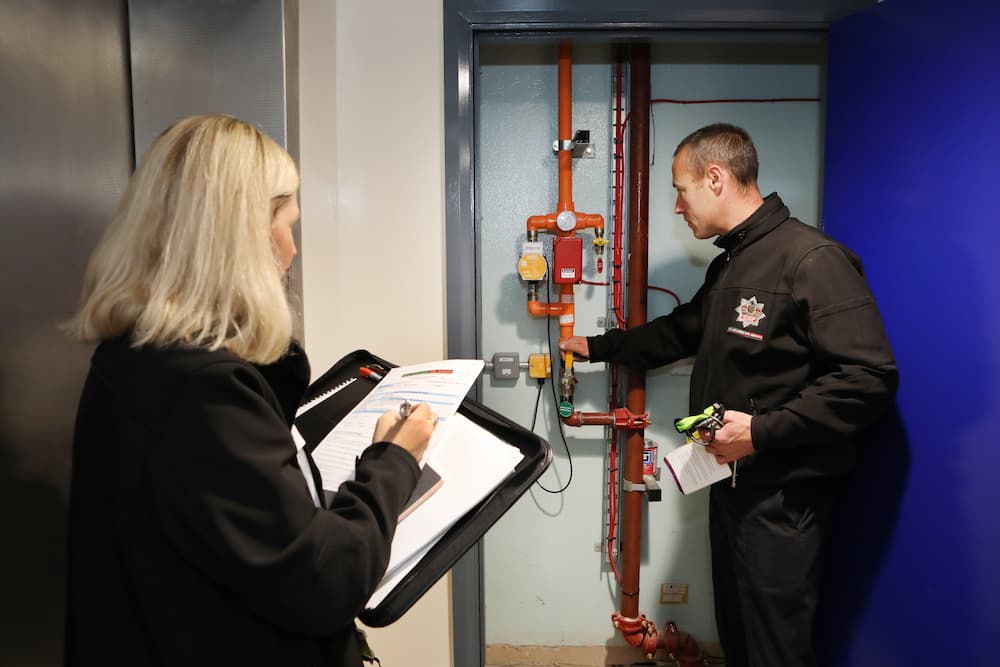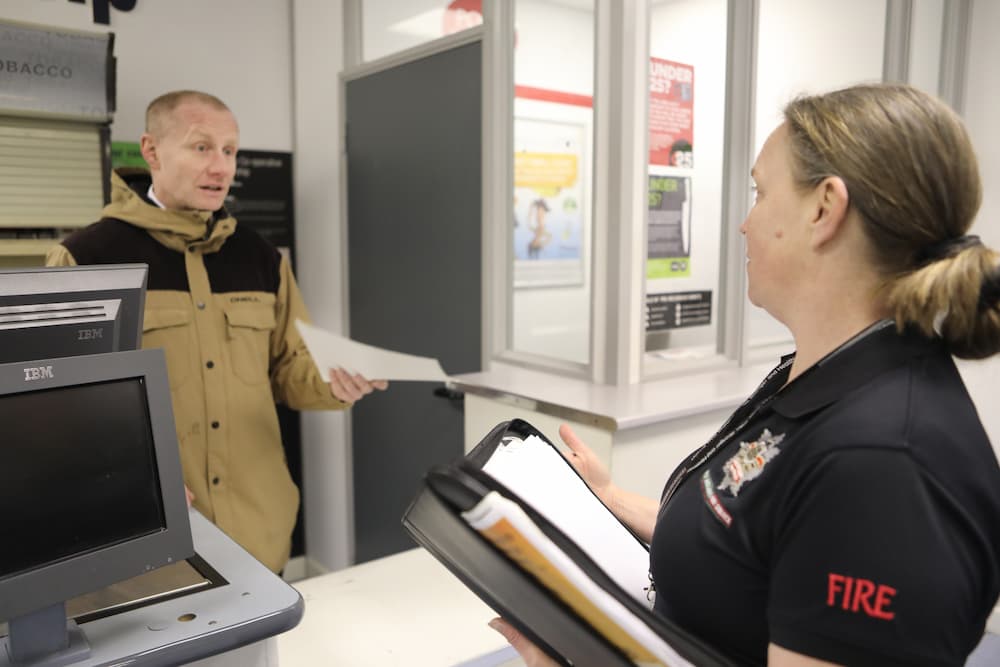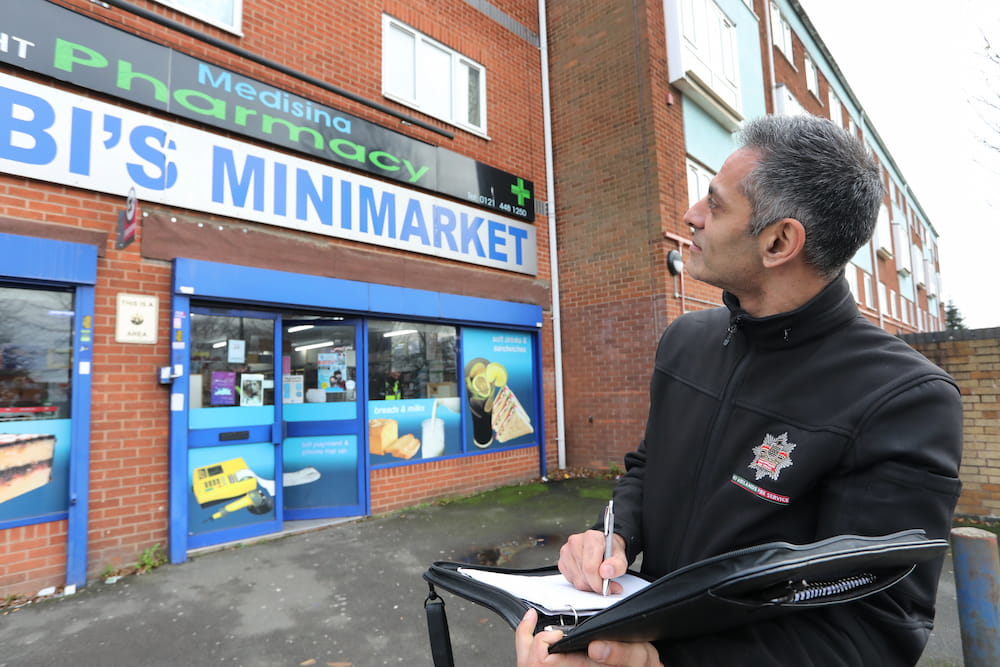Fire safety
Fire Safety in business or commercial settings is an important part of our work in keeping the communities of the West Midlands safe. We can offer support and guidance to your business through these services.
What is fire safety?
We’re striving to keep West Midlands premises and venues safe from fire, so you can work in or visit them safely.
This part of our work involves ensuring that premises comply with The Regulatory Reform (Fire Safety) Order 2005 designed to protect you from fire, such as:
- your workplace (most workplaces, but with some exceptions)
- your children’s nursery, school, college or university
- a small corner shop or a massive retail complex
- hotels and B&Bs, restaurant and takeaways, and leisure venues such as a gym, concert arena, theatre, cinema, theme park or zoo
places of worship - a hostel, medical surgery or hospital, nursing or care home.

Report a fire safety issue
We hope that all workplace, commercial, business and multiple residency premises’ owners and responsible persons will fully conform to their responsibilities under the Regulatory Reform (Fire Safety) Order 2005 (FSO).
If you believe a premises does not meet these standards, you can report this to us and we will investigate.
In the event a fire safety issue is an immediate threat to life, please DO NOT complete this form. Dial 999 and report it to us immediately.
Fire Risk Assessment
Fire Risk Assessments are a legal requirement for workplaces.
We can’t complete a fire risk assessment for you, but we can provide advice and guidance.
Our fire risk assessment section of our website will help you learn who needs to do them, what they involve and the penalties if you fail to do them.


Fire safety resources for businesses
In addition to guidance around fire risk assessments, we also have a range of resources to help businesses to keep their premises, customers and staff safe from fire and other risks.
These include our Safe and Strong visits.
National guides and documents from the National Fire Chiefs Council and Fire Industry Association, guidance on fire doors and a range of frequently asked questions covering our most asked topics.
Our teams in Fire Safety
Our fire safety teams cover a range of areas, from licensing for explosives and petroleum to legal enforcement powers, where necessary.
You can find out more about each team in our sections below.

Certain licences are granted by councils, not us. However, under Article 42 of Regulatory Reform (Fire Safety) Order 2005 (FSO), the local authorities must ensure that we can make representations before any licence is issued under the Licensing Act 2003. This is to protect ‘public safety’. Some examples are:
- to sell alcohol
- to provide ‘regulated entertainment’
- to provide ‘civil ceremony’ venues
- to provide late-night refreshment
- to provide sexual encounters venues.
Our fire safety inspecting officers review and inspect such premises and we must tell the local authority of any action we take.
Councils enforce the Safety at Sports Ground Act 1975 and Fire Safety & Safety of Places of Sports Act 1987 in the West Midlands. We advise them on fire safety measures in these premises.
We also enforce The Health & Safety At Work Act 1974, The Dangerous Substances and Explosive Atmospheres Regulations 2002, The Explosives Regulations 2014, The Fireworks (Safety) Regulations 1997, The Fireworks Regulations 2004 etc to ensure that petrol, explosives and fireworks are stored correctly in premises.
We also play a key role on councils’ Safety Advisory Groups (SAGs). The groups provide a forum for discussing and advising on public safety at an event. They aim to help organisers with the planning and management of an event, and to encourage cooperation and coordination between all relevant agencies.
Our Building Regulations and Planning team is based at our headquarters and consists of Fire Safety Inspecting Officers who work with local authorities. They are specialists who ensure that buildings are constructed and changed in accordance with all fire safety aspects of current building regulations.
Article 45 of the Regulatory Reform (Fire Safety) Order 2005 (FSO) says that, where it is proposed to erect, extend, alter or change the use of a building, the council must consult us before passing plans for premises where the Order applies. We then provide ‘observations’ on the plans.
Councils also consult with our Building Regulations Team regarding changes to buildings with a higher risk profile, such as properties that become licensed homes of multiple occupancy, or where the local authority has discovered properties that don’t have the necessary planning or building consents.
This team is also involved in major projects across the West Midlands before they even reach the planning stage. This ensures the infrastructure is in place to support our firefighting needs, and that fire safety provisions are made at the design stage of a structure or complex.
The Building Regulations and Planning team are based at our headquarters.
In spite of our work helping people who are responsible for businesses to comply with their duties under the Regulatory Reform (Fire Safety) Order 2005 (FSO), there are occasions when we need to take legal action against them, such as:
- where failure of duties imposed under the Order has led to one or more relevant person being put at risk of death or serious injury because of fire
- when someone fails to comply with an enforcement, prohibition or alterations notice served by us
- where measures put in place to protect firefighters are not maintained (conditions apply).
Under the Order, it is an offence in relation to fire safety measures to:
- fail to comply with general duties of being an employee where that failure places one or more relevant persons at risk of death or serious injury
- keep false records
- give information they know is false
- obstruct an inspector in their duties
- fail to comply, without reasonable excuse, with requirements imposed by an inspector (under Article 27)
- pretend, with the intent to deceive, to be an inspector
- charge an employee with the cost of providing the requirement of the Order
- fail to comply with any prohibition or restriction imposed by a Prohibition Notice.
Our legal team support our fire safety inspecting officers to produce accurate evidence and witness statements. They collate, manage and process all cases through to Magistrates’ and Crown Courts. They conduct interviews in line with PACE and PEACE codes of conduct, issue Simple Cautions, consult with our solicitors and barristers, and represent (where necessary) West Midlands Fire Service in fire safety court cases.
Our Engineering Team apply scientific and engineering principles, rules (Codes) and expert judgement, based on an understanding of the phenomena and effects of fire and of the reaction and behaviour of people to fire, to protect people, property and the environment from its effects.
Our engineers: –
- work with our Building Regulations team to evaluate the effectiveness of alternative solutions proposed by architects and designers to meet the requirements of Building Regulations
- assess and evaluate complex fire safety solutions proposed as part of a fire strategy for a building
- design and advise on alternative ways of providing fire safety measures for clients
- tender applications for the Government’s Primary Authority Scheme, and design and manage the accounts they win.
For more information on fire engineering, go to our Fire Engineering section.
Fire Safety Documentation
We have some key documents we refer to in our letters and documentation sent to responsible persons. For accessibility purposes, most of these documents are provided on our website in an electronic format linked in this section.
For any queries around documentation or letters you have received from us, please contact us.
You can call us on +441213807500
Email us: firesafety.admin@wmfs.net
Or write to us:
West Midlands Fire Service
99 Vauxhall Road
Nechells
Birmingham
B7 4HW